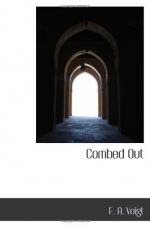We left the town behind us and waited near a barn in the open fields. We were joined by the two men who had remained behind to help our wounded fellow soldier.
“Is it serious?” we asked.
“Serious?—He’s done for, poor chap! A big bit of shell caught him right in the chest—it didn’t half make a hole. We carried him away from the billet and sat him up against a wall. We couldn’t stop the blood from flowing. He came to for a few seconds though, and moaned, ’O my poor mother! O my poor mother!’ enough to break your heart. And then he seemed to lose consciousness again. The ambulance arrived and we laid him on a stretcher. I expect he died before he got to the hospital.”
“Anybody else hit?”
“Two of our fellows—one of them pretty seriously. They could both walk though. A lot of men from other units have been killed. The last shell dropped into a mess-room and laid out a dozen or more, and just as we were coming along we saw an artilleryman lying in the road with a big hole right in the middle of his face. He was still warm but his heart had stopped beating. It’s a bloody awful feeling to lose one of your mates, though.”
“I can’t make it out, some’ow. ‘E was talkin’ an’ jokin’ to me only a few minutes back, an’ now ’e’s dead. The way ’e said ‘O me poor mother!’ nearly set me cryin’. Poor old chap, ‘e was one o’ the best—it’s allus the best as gets killed an’ the rotters left alive.”
No more shells dropped into the town that day, but instead of going back to the billet, the men made their beds in the barn at nightfall. I returned to camp, thinking of the man who was dead and wondering whose turn would come next.
IV
THE CASUALTY CLEARING STATION
“For who feels the horrors of war more than those who are responsible for its conduct? On whom does the burden of blood and treasure weigh most heavily? How can it weigh more heavily on any man or set of men than those on this bench?”
MR. BALFOUR (House of Commons, June 20th, 1918.)




